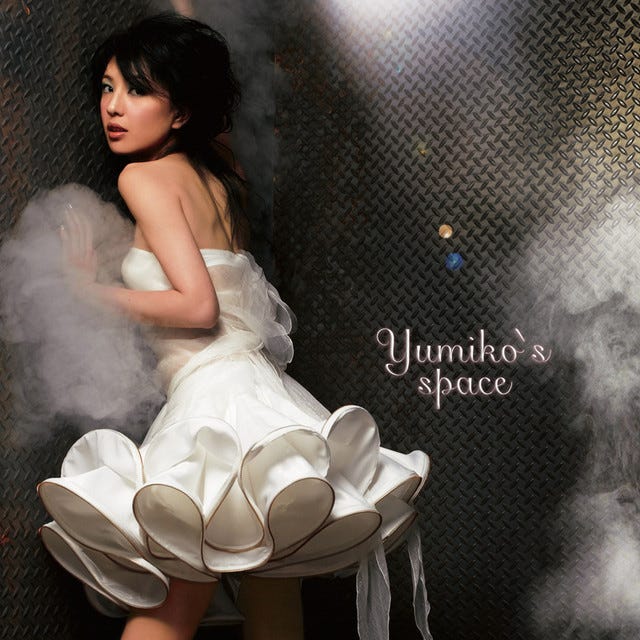Genre of the Day - Cantopop 🇭🇰
Album of the Day - Yumiko's Space by Yumiko Cheng 鄭希怡 (2005)
Though noted more now for its massive skyscrapers rolling up its otherworldly, verdant hills and as a center caught in history between China and the West, Hong Kong was once a humble port town noted mainly for its abundance of agarwood, which produces the signature and unmistakable scent of incense. The city’s prized incense has wafted across the rest of China for centuries, leading to its branding as the premier incense town; the name Hong Kong, 香港 in Cantonese, translates as “fragrant harbor.” Today, we investigate another Cantonese sensory experience that’s just as alluring and complex in representing the region and language’s complicated history.
Cantopop is unique in the realm of East Asian pop traditions in the sense that, like the Cantonese language itself, it has had to circumvent the looming dominance of Mandarin and, locally, English in developing as a distinctive representation of regional identity. Cantonese is the prestige form of the Yue branch of Sinitic languages, and though 82 million speakers is no small change, it’s still dwarfed by Mandarin—Yue speakers only encompass 5.6% of speakers of Chinese languages. As a form of Chinese that hasn’t been as formally enshrined as Mandarin, Cantonese has often been debased and looked down upon by some, especially locally in favor of English as a major class marker in Hong Kong. In light of Cantonese still being many people’s daily language and an important portion of regional identity, Cantopop subverted these odds by taking pride in the many-toned (nine tones to Mandarin’s five) language.
Cantopop initially grew out as a branch of shidaqui. Shidaqui brewed in Shanghai in the 1920s as the first blend of western pop traditions, namely contemporary and grand jazz, with Chinese popular song forms. Most Hong Kongers could not understand the Mandarin shidaqui, so local musicians took the genre’s growing popularity as a sign to thrust traditional Cantonese opera into a new pop era. Thus, the origins of cantopop are in a refined literary iteration of the language—a poperatic phenomenon that persists to this day in cantopop. Thus, the genre and industry of cantopop exists in a culturally insular realm, perhaps as a reaction to the constantly creeping dominance of English and now mainland Chinese influence over the city’s history as an economic hub.
Cantopop solidly emerged from its opera-shidaqui predecessors in the 1970s as the economy began to skyrocket. Its development also underscores how, as a genre arguably defined by its commercial salience (though, obviously, meta-transcendental interpretations of pop have always abounded within that context), the tides of pop are at the behest of the scene’s local condition. In his ambitious history of cantopop, Hong Kong studies expert Yiu-Wai Chu points out that as a culturally unique entity that has never been politically free from domination, the city has always mimicked independence through an extreme focus on economics. Thus, poppity-pop, catchy, ‘pure’ pop rather than rock-focused pop has always dominated the market in the form of ballads and dance music.
By 2005, several of the old titans of cantopop’s 1980s heyday had passed or fallen away, but new artists took up the torch to spur it into a new post-handover local and regional context. Yumiko Cheng was one such innovator, taking cantopop in intriguingly grimy directions, inadvertently representative of the city’s staggering density by this point. “阿拉伯市場” opens with an out-of-left-field string sample and off-kilter bass, sonically venturing into an Indian vocal sample as the song makes it through Yumiko’s dancefloor of wonders. The electro, spacey shimmer of “想” is irresistible euphoria, striking a contrast to the deliciously dark acid-techno tinged “懶音詩人,” her vocals drifting into abject distortion as the track’s ground continues to shake. From Miami bass with a snarling bite (“閃”) to the city-pop overtones of “遊魂”, Yumiko Cheng proves cantopop as a deft interpreter of worldwide dance trends in a unique, defiant cultural context that would become more pertinent as the city fought increasingly (and sadly, it seems, ultimately unsuccessfully for now) for its democracy through music; though independence remains beyond reach, cantopop still lends a potent voice to Hong Kong’s society.








For around 20 years I spent about one week each month in HK and China on business. Canto-pop was everywhere, and ubiquitous in the lounges of the 5-star hotels, where many business meetings took place. It was even popular on the mainland. Thanks for bringing back some of those vibes!
1. Hong Kong translation blew my mind
2. Yumiko Cheng slaps